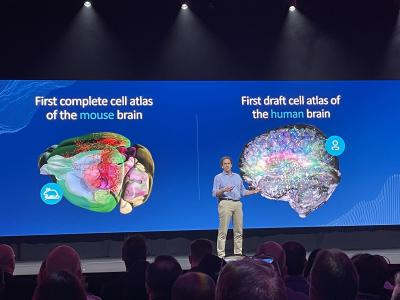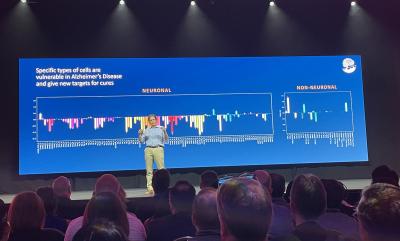AWS Summit DC, Washington, DC – Amazon Web Services (AWS) is teaming up with neuroscientists at the Allen Institute for Brain Science to help them answer this infamous question posed on Star Trek: "Brain and brain! What is brain?!" By using cloud technology to map cell types and functions across the brain, researchers believe they can identify the sites of neurological diseases like Alzheimer’s and Parkinson’s and better target efforts to find cures.
Speaking at AWS’ public sector focused Summit this week, Allen Institute Senior Investigator Ed Lein noted brain diseases collectively affect more than 1 billion people worldwide. But efforts to find effective treatments and cures have been hindered by two main challenges: first, scientists still don’t have a very good understanding of the brain, and second, there’s an enormous amount of distributed and disorganized research data about the brain spanning multiple medical disciplines and publications.
Lein said the Brain Knowledge Platform the Allen Institute is building with help from AWS is designed to solve both of those problems. The idea is to deliver a “unifying framework” for the field of neuroscience and make information from various disciplines searchable under one roof.

Cloud component
Here is where the cloud comes in. Lein acknowledged that trying to compile, sort, store and make searchable massive amounts of data about the brain is more of a technological challenge than a scientific one.
Already, the project has generated more than 20 Petabytes of data and that number is expected to grow into Exabytes. Lein said AWS offers researchers a scalable storage mechanism. He added they can also tap into AWS’ databasing, graph analysis and generative AI solutions to help classify data and enable intelligent searches.
AWS’ integrated framework “presents the opportunity to revolutionize the way we explore and we discover scientific” knowledge," he said.
“Our goal is to democratize data access and allow anyone to freely explore the data,” Lein added.
Brain power
While still in its early phases, the Brain Knowledge Platform aims to create “one of the largest and most complete knowledge storage sources of truth in neuroscience," Lein said, and integrate information from across “neuroscience, genomics, medicine, from basic research to neuro imaging data to clinical data."

The project includes an effort to create a Brain Atlas, which is basically a map of all the different cell types in the brain to help researchers better define what makes up different structures in the brain. By measuring what kinds of brain cells are lost, active or inactive in different disease states, researchers can hone in on certain cell types as targets for disease therapies.
Researchers have already mapped out the brain of a lab mouse – discovering in the process that it contains around 200 billion cells categorized into about 5,000 types. They’re currently drafting a map of the human brain, which Lein said is expected to be at least equally complex if not moreso.